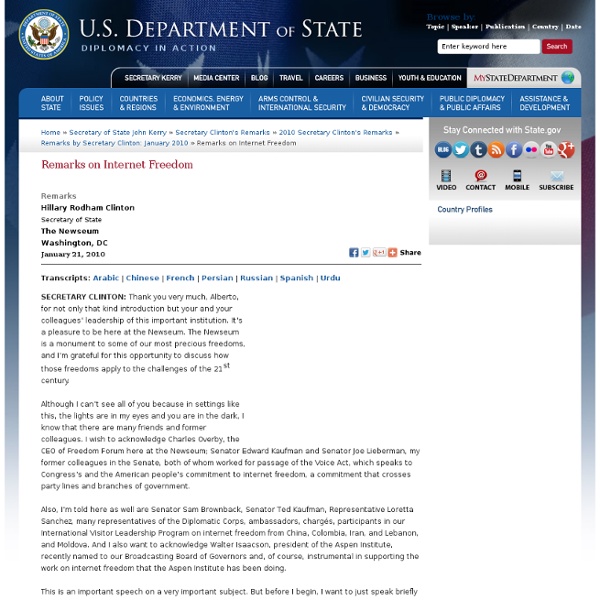



Clinton's metaphor for internet freedom!? Clinton urges Internet freedom, condemns cyber attacks WL & 21st Cent. statecraft Have 250,000 leaks sunk the State Department’s ‘Internet Freedom’ policy? by Roy Revie As the fallout of Cablegate continues to consume column inches, gigabytes, and cabinet meetings across the world, the realisation that this is about more than one man, one organization, and one massive leak seems to be slowly sinking in. While some argue that stories and comment focusing on the process of the leak and the fallout for the organisation only distract from the stories contained within the cables themselves, it is clear that this element is as vital (in the short term at least) as the contents of the cables. We find ourselves in the middle of an unprecedented public debate on Internet freedom and the role of the state online. Perhaps ominously, the speech was prefaced by a shout-out to Joe Lieberman for aiding the “passage of the VOICE Act, which speaks to Congress’s and the American people’s commitment to internet freedom, a commitment that crosses party lines and branches of government”.
ESRI Geo-tagged Tweets It seems the ever evolving Geo Viewer from ESRI (recall the Flex viewer that ESRI has been building on all week) now incorporates the ability to search and display Geo Tagged Tweets. Using the app, select the Tools icon (cube), then select the Twitter Option. This reveals a Twitter results box in the lower right region. One has to wonder that if communications permitted, individuals that require assistance could be sending geo located Twitter Tweets quickly and easily via their mobile, enabling relatively accurate location of those needing help. An interesting tool for sure! Select Twitter option from Tools Menu The Twitter results window Drawing a search area in the viewer The results
Clinton unveils U.S. policy on Internet freedom | Relevant Resul WASHINGTON--Secretary of State Hillary Rodham Clinton unveiled on Thursday a new U.S. policy that encourages the world's governments to ensure their citizens have open access to the Internet. The speech comes a little more than a week after Google's blunt declaration about Chinese censorship and illegal electronic intrusions, and the company's assertion that it will pull out of China if it can't reach a reasonable understanding with the Beijing government. 9:54 a.m. "In many respects, information has never been so free," Clinton said. "We stand for a single Internet, where all of humanity has equal access to knowledge and ideas," Clinton said. 10:01 a.m. The final version of the speech does single out "Chinese authorities" directly, while including other indirect references--"we must work to advance the freedom of worship online"--to the communist nation's sometimes brutal treatment of its citizens. 10:05 a.m. Audio Podcast Subscribe now: iTunes (audio) | RSS (audio) --U.S. 10:06 a.m.
Intermediary censorship By Index on Censorship / 3 December, 2010 Private ownership of web hosting raises serious questions for free expression, says Jillian C York WikiLeaks’ latest release is making its rounds in the media. Links to cablegate.wikileaks.org are circulating, posted on Twitter and Facebook, passed around in emails. After several releases from the whistleblowing organisation, we’ve begun to take for granted that the leaked information — at least what’s already online — will be accessible to us. As Rebecca MacKinnon points out, this isn’t the first time Lieberman has made such a call; in 2008, the Senator demanded removal of “content produced by Islamist terrorist organisations” from video-sharing site YouTube. There is, of course, a precedent for content removal at government request as well…plenty of it, in fact. These examples represent a broader trend, which Ethan Zuckerman has termed “intermediary censorship.” Tags: free speech | intermediary censorship | wikileaks
Helping Haiti respond to the earthquak (Cross-posted from Official Google Blog) These recent satellite images of Port-au-Prince, Haiti before and after Tuesday's earthquake dramatically show the devastation caused by magnitude 7.0 trembler. Here are before-and-after screenshots of the National Palace and an area of Port-au-Prince: Click to see full-size In order to help the people of Haiti respond to this catastrophe, Google is donating $1 million to organizations on the ground that are rescuing those still trapped and providing clean water, food, medical care, shelter and support to those affected. You can also use the below buttons to donate to UNICEF or CARE. Donate to CARE Donate to UNICEF In addition, Map Maker data has been made available to U.N. organizations and the team is working with the Map Your World Community to encourage Map Maker users with on the ground knowledge to help update the map of Haiti with disaster response data. We've also reached out to the YouTube community for help.
Senators tell Facebook: tighten privacy policy